#salaf us salihin
Explore tagged Tumblr posts
Text

Copied.
#islamic posts#islamic knowledge#islamicreminders#islamicquotes#salaf#salafimanhaj#salaf us salihin#sayingsofthesalaf#companionsoftheprophet#sahabas#dhikr#muslim#repentance#taqwa#tawheed#tawakkul#welcome to islam#revertmuslims#ahlussunahwaljamaah#alfirqatunnajiah#islamic videos#islamic books#islamic jurisprudence#Qur'an#sunnah#aqeedah#hadiths#reminderbenefitsthebelievers
42 notes
·
View notes
Note
Does self-reliance mean to rely on one’s soul? What is the relationship between reliance on Allah and self-reliance?
Self-reliance (self-confidence) means to keep one’s will strong and to remain sound and resolute in the face of events, that is, not to fall into despair. When man attains success, he should attribute it to Allah, not to himself. Besides, this is the real self-confidence. If he attributes his achievements to his own soul and feels conceited, it will be dangerous for him.
It is necessary to keep away from despair, arrogance, conceit and having bad thoughts about others, which are spiritual diseases.
If one is deprived of “spiritual armors” in an age when matter is determined to suffocate spirit, his spirits are bound to suffer crises and illnesses though his body is beautiful and strong.
The earth harbors plenty of people who struggle to feed their bodies but who suffer all kinds of “crises of true path” due to spiritual hunger. Believers struggle against some spiritual illness due to the effect of the infectious disorders of this age and they flounder helplessly because they are unaware of the diagnosis of their diseases and ways of treatment. However, the rich resources of Islam, like the Quran, which is the source of miracles, and the Sunnah of the Messenger of Allah, include remedies for those diseases. The biggest illness of the people of this age is to be unaware of the remedy. Let us analyze four important spiritual diseases that are common today:
1. Despair (Hopelessness)
A person who cannot succeed in doing righteous deeds and worshipping as he wishes and who cannot fulfil those duties fear the penalty in the grave and Hell. He falls into despair. Most of the people who cannot fulfill their duties of worshipping by being overcome by their souls due to laziness and the negative effects of their environment and who flounder in the quagmire of debauchery fall into despair. This illness can lead a person to unbelief and denial.
A person who loses hope of getting rid of the bad state he is in is easily defeated by doubts and delusions. Such people want to hold on to the weakest and smallest claims that lead people to the opposite of religious issues and to deny the issues of belief and creed as if they are great and strong evidences. If this state continues, he will rebel and exit Islam. He will join the army of Satan. For instance, the soul of a person who finds it difficult to perform prayers desires that performing prayers not be fard. If a Satan-like person causes a delusion in him that prayer is not fard, his soul wants to hold on to that baseless claim; if he falls into this trap, he will lose his belief. This is the perilous end of the illness of “despair”.
The following verse is the remedy for those who catch the illness of despair and who cannot do righteous deeds:
“Say: "O my Servants who have transgressed against their souls! Despair not of the Mercy of Allah: for Allah forgives all sins: for He is Oft-Forgiving, Most Merciful.” (az-Zumar, 39/53)
2. Arrogance (Reliance on deeds):
A person who cannot worship and falls into despair starts to seek points of support since he is afraid of divine penalty. He sees that he has some good deeds and holds on to them. He thinks those deeds will be enough for his salvation and relaxes. However, this state is “ujb”, that is, reliance on deeds; it leads man to unbelief and aberration. For, man has no right on the good deeds, worshipping and favors that he does. They do not belong to him; how can he rely on them? What wishes charity and righteous deeds is “Allah’s mercy” and what creates and grants them to man is “Allah’s power”. Man’s share in charity and righteous deeds is to accept, to pray, to be pleased with and to demand. It is Allah Almighty who gives man his body, health and strength and who gives him life to do righteous deeds.
Hz. Abu Hurayra narrates: the Messenger of Allah (pbuh) said,
‘(O believers!) Do your deeds and worshipping moderately; avoid extremism. For, Deeds will not save any of you from fire.’ The Companions asked, ‘O Messenger of Allah! Will deeds not save you either? The Prophet answered, ‘Not me either.’ He added, ‘If Allah does not forgive my sins with His mercy and grace, my deeds will not save me either.’
Man should give up relying on his deeds and claiming to be the owner of his charity and worshipping. He should know that he could make mistakes only to himself. Whatever good comes to him is from Allah. Whatever bad comes to him is from his own soul. The body and life are among the things entrusted to man. Man should always say, “To Him belongs sovereignty and to Him is praise due. There is neither might nor power except with Allah.”
3. Conceit
Conceit originates from man’s not knowing himself. Conceit is the biggest mistake of a person who is unaware of his weakness, poverty and incompleteness. Man is deprived from all material and spiritual maturity due to conceit. There is only one thing that a conceited person, who likes himself, keeps away from: Prayer mat. The face of the conceited person who does not prostrate is dark. A person who has no trace of prostration on his face is in abasement so much that he kisses the feet of his soul. Even if a conceited person prostrates, his spirit is upright. What matters is to make the spirit prostrate. The only friend of a conceited person is himself. His student and teacher is himself. A conceited person is the meanest idolater. If a person regards his own knowledge sufficient and disdains to consult to others due to his conceit, he is an incomplete person. Such people become deprived of the beauties and ideas of other people and, what is more, from the guidance of the blessed people, that is, “salaf as-salihin” that lived in the past; they will abandon the line of Islam. The only fruit of conceit is deprivation.
4. Having bad thoughts about others
Man should have “good thoughts” about others. He should regard others as superior to him. Having bad thoughts about others will cause man to think that others also have bad characteristics like him. Having bad thoughts about others breaks off the ties of reliance among Muslims and shakes the foundations of the community. A believer should not have bad thoughts about others, especially the beloved slaves of Allah, if he does not know the and reason for their behaviors.
Hz. Abu Hurayra narrates: the Messenger of Allah (pbuh) said,
“Beware of suspicion about others, as suspicion is the falsest talk. Do not spy upon others, and do not seek news about others' affairs; do not compete against one another; do not be jealous of one another; do not hate one another; do not turn your backs to one another. O slaves of Allah! Be brothers as Allah ordered you. A Muslim is the brother of another Muslim. He does not oppress, deprive and insult his brother. It is enough as evil for a person to insult his brother. It is haram for a Muslim the wealth, blood and honor of another Muslim. Allah does not look at your shapes and bodies, but your hearts and deeds. Taqwa is here – he pointed at his chest. Never sell something after selling it to another person. O slaves of Allah! Be brothers! It is not halal for a Muslim to be cross with his brother more than three days.” (Bukhari, Nikah 45)
To have the ethics of the Quran and to enter the luminous circle of the Sunnah will keep us away from spiritual diseases. If we do not adhere heartily to the Quran and the Sunnah, which are the only sources of remedy for the spiritual diseases, four of which we have tried to explain above, we may lose our eternal life.
May Allah Almighty save us from all kinds of spiritual diseases and weakness of belief!
Self-reliance that is away from those diseases will lead man to perfection. Otherwise, man cannot get rid of being a slave of his soul.
#Allah#god#islam#quran#muslim#revert#convert#revert islam#convert islam#reverthelp#revert help#revert help team#help#islam help#converthelp#prayer#salah#muslimah#reminder#pray#dua#hijab#religion#mohammad#new muslim#new convert#new revert#how to convert to islam#convert to islam#welcome to islam
1 note
·
View note
Text
There are a number of posts which are circulating on social media, all in all of which attempt to criticise, defame and undermine the continuous efforts and struggles of,
_Allamah Rabbani Shaikh Muhammad Nasir al-Din al-Albani (1420H)_
Some of these people, and I say this politely, have demonstrated dire comprehension of intricate issues while others have manifested their innate hatred and animosity for this Allamah Rabbani, based on nothing but tassub, tahazzub and their ignorance.
The life and efforts of Allamah Rabbani Shaikh Muhammad Nasir al-Din al-Albani are well known and comprehensively documented, and no one can deny this even if they tried. In reality we do not need to mention his virtues, his efforts and works. The words "authenticated or graded xyz by al-Albani" in almost every other Islamic book by friends and foes alike, is unprecedented virtue by any account.
However, sometimes a general reminder to ourselves and to our mutual friends, puts things into perspective.
Oh insignificant one's, Let us remind you of who al-Allamah Rabbani Shaikh Imam Muhammad Nasir al-Din al-Albani is.
He was the man who was born in a european country, which was and still is virtually unknown, he was responsible for putting that country on the map for Muslims, academics as well orientalists. Who knew Albania except through our Allamah.
He was forced to move from his country at a young age due to communism. He moved to Syria with his family who were strict practising Hanafis. They made fun of him in the classroom while he excelled beyond degree in his Arabic language, syntax and morphology compared to his fellow classmates. They would say what does this Ajami know.
He was ostracised, shunned and thrown out of his family home by his strict hanafi family due to his firmness in sticking to the Quran and Sunnah.
Poor and destitute, worked as an honest watchmaker, who would look for scraps of pieces of paper to write prophetic Hadith on, to the extent he would write complete volumes of books in this way
He would travel the city to the library and the locals would make fun of him due to him riding a bike, they ridiculed him nationally in their newspapers.
He was imprisoned in syria by the mulhid bathists Alawite shias, numerous times for teaching the Quran and Sunnah as well propagating Salafi Dawah. He was put in prison repeatedly and tested with their evil plots time and time again.
He was forced to move to Jordan, than UAE, then Syria again and then to Jordan, due to the hatred of the innovator heretics.
He single handedly rebuked and took charge of chief innovators and clear deviants a like. These deviants were the heads of misguidance who misguided thousands to innovations and corrupt beliefs and heresies, from the likes of
The heretical Muhammad Zahid al-Kawthari, the chief innovator who reviled everyone from the Sahabah to the Great Salaf us-Salihin
His student, Abdul Fattah Abu Guddah the Asharite Hanafi apologist and proponent of the Deobandis
The Syrian Sufi Asharite, Muhammad Said Ramadhan Buti.
Then he dealt with, not 1, not 2 but three of the Ghumari brothers of Morocco, Ahmad, Abdullah and Abd al-Aziz.
He took charge and held at Bay the evil heresies and ideas of Abdullah al-Harari ie the founder of the al-Ahbash and his cult beliefs.
He answered and dealt with the rafidi arch liar, Hassan Saqqaf.
Also the Deobandi and dubious Habib ur Rehman al-Azmi, who did not have the guts use his real name, he was also answered and subdued.
And the list, by the permission and assistance of Allah alone is continuous.
The man who checked over 30,000 ahadith and wrote over 200 books, some of which run into volumes!
The man who single handedly organised the whole of maktabah Zahiriyyah library, which was one of the most important libraries of the Islamic world.
The man who produced some of the most prolific students and formidable scholars this century has seen.
And then......you have the audacity to attack this man with your childish and immature remarks!
We do not go beyond bounds in praise of our Ulama and neither do we make open blind taqlid of them,
However after praising Allah, we thank him for sending us this mujaddid. May Allah have mercy on him, forgive him and accept his efforts and servitude. Amin
Oh ignorant ones, whoever you are, know your maqam and manzilah when you talk about
Allamah Rabbani Shaikh Muhammad Nasir al-Din al-Albani
Salafiri.com
Bookstore.salafiri.com
Forum.salafiri.com
4 notes
·
View notes
Text
WE SHOULD THINK WELL OF OTHERS: Part 1
People’s way of thinking shapes their behavior. The way they are is parallel to how they think, and is connected to their potential. While a person keeps looking at things or events from the perspective of certain considerations, their character and temperament will gradually take shape in line with that way of thinking. As Nursi puts it, “A man who sees positively will think positively” and such a person lets good things blossom within himself, living in the Paradise he has formed in his soul. As for a person who looks around from the darkness of their own soul and smears everything with the ugliness inside them, they complain about everyone and can never see anything positively, think beautifully, or truly enjoy life.
We can say that just as earth, air, water, and their constituents have an influence on the development of a plant, so do thoughts and intentions have an influence on the development of the ethical conduct and character in a person. As flowers flourish from seeds and birds hatch from eggs, lofty souls and perfect characters are nurtured by beautiful thoughts and pure intentions. Moreover, those who live as if they constantly breathe a heavenly atmosphere thanks to their noble thoughts and sincere intentions begin to send out the fragrance of the same climate around them in time. They turn their surroundings and other people’s hearts into gardens of Paradise. As for those possessed by ugly thoughts or evil intentions, they virtually cause people to drink poison even in heavenly atmospheres.
Good Opinion is a Form of Worship
Being constantly filled with considerations that are welcomed by the conscience and cherishing positive views about another person is termed as having a “good opinion” (husnu dhan) in religion. As a religious term, good opinion denotes good intention, positive thinking, and perception of the beautiful; this reflects a person’s inner purity and faithfulness. It is most becoming for a righteous believer to maintain good intentions and take everything from the positive when making evaluations about persons or events.
Holding negative thoughts about someone is called having an “ill-opinion” (sui dhan), and this is based on suspicion. God Almighty reveals the evil of suspicion about other people in the following verse:
O you who believe! Avoid much suspicion, for some suspicion is a grave sin (liable to God’s punishment); and do not spy (on one another), nor backbite (against one another). Would any of you love to eat the flesh of his dead brother? You would abhor it! Keep from disobedience to God in reverence for Him and piety. Surely God is One Who truly returns repentance with liberal forgiveness and additional reward, All-Compassionate (particularly towards His believing servants).
Likewise, God’s Messenger counseled against suspicion, since suspicion is the worst of lies. He also warned us against prying into others’ affairs, eavesdropping, feelings of rivalry or jealousy, rancor and turning our back against others; he counseled God’s servants to be brothers and sisters. He warned us against suspicion and all behavior that might harm brotherhood. In addition, God’s Messenger stated that a person’s having a good opinion of others is because that person is a good servant of God. The Prophet Muhammad considered sincere intentions, positive thoughts, and beautiful perspectives to be a sign of maturity in Islam, a deepening in faith, and soundness brought by living with the awareness of constantly being seen by God. The Prophet not only took an oath of allegiance from his Companions, he also received their promises about having good intentions toward all believers.
Said Nursi listed the four great spiritual handicaps, and he also mentioned the possession of an ill-opinion of others alongside hopelessness, self-pride, and vanity. He emphasized the importance of having good opinions. A person should not see all other people as superior to themselves, nor should they project the weakness or ugliness that is in their own person on others through suspicion or make the mistake of criticizing certain attitudes and acts of others without knowing the underlying reasons. At this point, I would like to mention a serious mistake related to the subject. Disapproving of certain attitudes of the early generations of Muslims who followed the Companions (salaf al-salihin) without knowing the wisdom behind is also an ill opinion. Ill opinion is one of the devil’s traps that harms society in terms of both material and spiritual life.
It is our duty to cherish good opinions and we must always think positively, particularly about believers. Imam Khadimi, the author of Bariqa, says that “even if you see a believer committing adultery, do not rush to make a judgment about him, wipe your eyes and say ‘My God, that person does not commit such an ugly deed, I must have seen wrong.’ Turn back and look again to make sure. If that is really him, then say ‘I have probably seen mistakenly again.’ One more time disbelieve your eyes, wipe them and look again. If you become certain that the person you have seen is the same person you thought, then say ‘There is no strength or power except with God Almighty’ and pray for that person: ‘O God, save him from this ugly state, and save me from falling into such a sin also’ and move away from there.” Although I do love Imam Khadimi and have deep respect for him, I find some excess in these words; we do not need to wipe our eyes and look back time and again and inquire into that deed. Because, we still have some doubt after the first look and that doubt can be the means for dismissing any negative thoughts about the other person. Inquiring into the matter further might serve to verify the negative possibility. Therefore, when we witness ugliness, we should immediately walk away without spying into the affair, identifying, or verifying it, before the unpleasant sights flow into our heart and take the form of a judgment. We should say “O God, grant guidance to your sinning servants, and forgive me,” and then forget what we have seen.
The person who has committed that sin may have fallen once but they may have then repented instantly, washing away his sins with tears, and he may have been forgiven. However, the person who witnessed the case and verified it through spying into it cannot help thinking about that ugly deed every time he remembers it and therefore cannot get rid of their mental contamination, unable to free themselves from the damage of ill-opinion.
Moreover, even though legal witnesses play a role in maintaining law and order in a society, there is no duty to reveal people’s vices in Islam. There is no such ethical rule that requires us to investigate the faults of others, to divulge them, or to embarrass these people. On the contrary, searching out faults and mistakes, divulging sins, and humiliating others are considered to be immoral in Islam. In this respect, even if a person has ten attributes of unbelief and only one sign of faith, we must keep as good an opinion of them as we can. That person is supposed to fear for himself and worry about his afterlife. However, we must never see him as a hypocrite. We need to remember the principle that being wrong in a good opinion is better than proving right an ill opinion, and we must act according to this. Naturally, we can be more cautious about whether we should give certain duties or responsibilities to people who have attributes of unbelief for the good of servitude on the way of God. We should remember the principle to adhere to when dealing with such people: “good opinion, non-reliance.” In order to let them have a share in the blessings of serving the faith, we can give them certain duties, but refrain from entrusting them with critical responsibilities. Thus, we will avoid serious mistakes and we will carry out the requirement of holding a positive opinion, thus allowing these people to rid themselves of ugly traits and to become sincere believers. Nevertheless, we should not forget that good opinion and trust are among the essential components of those who are devoted to the same cause and we should never fail to trust one another because of some piece of information that is not based on certain facts, or be misled by trivial reasons, suspicions, or the devil’s whisperings. We need to avoid over-generalizing the principle of “non-reliance.”
#allah#god#muhammad#prophet#sunnah#hadith#quran#ayat#islam#muslim#muslimah#hijab#help#dua#slah#pray#prayer#convert#revert#reminder#religion#welcome to islam#how to convert to islam#New Muslim#new revert#new convert#revert help#convert help#islam help#muslim help
1 note
·
View note
Note
salaam, if us muslims are supposed to be private in our worship, why is it necessary for muslimahs in western countries to wear hijab as it is basically a statement of our religiousness in western countries. People over here don't look at muslim women the same as people in muslim countries do. In muslim countries, it is the norm to dress in hijab. Over here, you stand out too much. I'm just a western revert trying to cope with living as a muslimah over here. it's so hard.
Wa alaykum assalam beauty 🌸
I honestly love your question so much. Like I remember smilingridiculously when I received it.
You’ve brought up a very important topic which is basicallythe dilemma of wanting to keep your deeds hidden and thinking that you’ll becontradicting them by wearing hijab in public. Thing is, in Islam, there areworships that are naturally done in public, like hajj or umrah for instance,you can’t be private about it, you’ll be performing it around million othersmuslims. Or like praying in congregational , you can’t be private about it either.Or attending a halaqa.
So there are certain worships in Islam that can’t beprivate, and hijab, niqab or a beard are of them. So since we cant be privateabout them, we should be sincere. As in you’ll be doing that certain worshipnot for showing off, and you shouldn’t be thinking too highly of yourself aboutit. You try to be as sincere as possible, as in you’re doing this certain worshipsolely for Allah, and you wouldn’t care if there weren’t anyone watching you orten thousand, and you should also pray to Allah that He accepts the little you’redoing. Humble yourself through reading the stories of the companions and thesalaf.
I get it’s hard, wallahi I do. But wallahi Allah knows howhard it is for you and you’ll be rewarded immensely for it inshallah. You’ll berewarded for every drop of sweat, for every dirty look you receive on the streets,for every time you get discriminated. Allah is the All-Seeing, the All-Hearing and He seesyour struggle and don’t ever think that you won’t be rewarded for it. And trust me it isn’t just hard in the west, we still face discrimination and have some of our rights denied in the middle east just because we wear an extra layer of clothes. So you needto keep reminding yourself of the prize here. The prize is Jannah,
Sahl bin Sa’d (May Allah be pleased with him) said:
I was in the company of the Prophet (ﷺ). He gave a description of Jannah and concluded with thesewords, “There will be bounties which no eye has seen, no ear has heard andno human heart has ever perceived.” He (ﷺ)then recited this Verse:
“Their sides forsake their beds, to invoke their Rubbin fear and hope, and they spend (in charity in Allah’s Cause) out of what Wehave bestowed on them. No person knows what is kept hidden for them ofjoy…” (32:16,17) [Al-Bukhari]. [Riyad as-salihin, book 20, hadith 1891]
It’s like being asked to work over time for a year, and afterthat you’ll have your salary tripled for life. Will you be exhausted duringthat year? Yes. Will you probably think of giving up? Yes. Should you stick tothe contract so you’d receive your reward? Also yes.
Thing is, we’ve become so materialistic subhanAllah. We wantto be rewarded here, we want to be eternally happy here, and Allah neverpromised us that in dunya.
“Know that the life of this world is but amusement anddiversion and adornment and boasting to one another and competition in increaseof wealth and children - like the example of a rain whose [resulting] plantgrowth pleases the tillers; then it dries and you see it turned yellow; then itbecomes [scattered] debris. And in the Hereafter is severe punishment andforgiveness from Allah and approval. And what is the worldly life except theenjoyment of delusion.” [Surah Al Hadid 57:20]
So yes, it’s hard, even prophet Muhammad peace and blessingsbe upon him said so,
Anas bin Malik narrated that the Messenger of Allah(s.a.w)said:
“There shall come upon the people a time in which theone who is patient upon his religion will be like the one holding onto aburning ember.” [Jami’ at-Tirmidhi 2260]
So I know in this time and age how hard it is to hold ontoyour faith, and it does feel like you’re holding onto a coal sometimes, but that shouldonly urge you to hold onto your deen tighter, because through that inshallah you’ll know thatyou’re on the right path, and through that you’ll pray that Allah accepts yourdeeds and grants you Jannah. Wear your hijab with pride because you’ll be doing it to please Allah.
May Allah grant you the hijab He approves of and may Heincrease you in faith and may He keep you steadfast and grant you Jannah andmay He grant you happiness in both worlds xx
9 notes
·
View notes
Text

Copied.
#islamic posts#islamic knowledge#islamicreminders#islamicquotes#salaf#salafimanhaj#salaf us salihin#sayingsofthesalaf#companionsoftheprophet#sahabas#dhikr#Muslim#repentance#taqwa#tawheed#tawakkul#welcome to islam#revertmuslims#ahlussunahwaljamaah#alfirqatunnajiah#islamic videos#islamic jurisprudence#islamic books#Qur'an#sunnah#aqeedah#hadiths#reminderbenefitsthebelievers
12 notes
·
View notes
Text




Aqeedah series, part XXV [ A ]
Where is ALLAAH, the Throne-bearer ?
#islamic posts#islamic knowledge#islamicreminders#islamicquotes#salaf#salafimanhaj#salaf us salihin#sayingsofthesalaf#companionsoftheprophet#sahabas#dhikr#muslim#repentance#taqwa#tawheed#tawakkul#welcome to islam#revertmuslims#ahlussunnahwaljamaah#alfirqatunnajiah#islamic jurisprudence#islamic books#islamic videos#Qur'an#sunnah#aqeedah#hadiths#reminderbenefitsthebelievers
6 notes
·
View notes
Text





Aqeedah series XXVI
#islamic posts#islamic knowledge#islamicreminders#islamicquotes#salaf#salafimanhaj#salaf us salihin#sayings of the salaf#companionsofprophet#repentance#dhikr#muslim#welcome to islam#revertmuslims#ahlussunahwaljamaah#alfirqatunnajiah#islamic books#islamic jurisprudence#islamic videos#Qur'an#sunnah#aqeedah#hadiths#reminderbenefitsthebelievers
4 notes
·
View notes
Text

#islamic posts#islamic knowledge#islamicreminders#islamicquotes#salaf#salafimanhaj#salaf us salihin#sayingsofthesalaf#pious#predecessor#dhikr#muslim#repentance#welcome to islam#revertmuslims#ahlussunahwaljamaah#alfirqatunnajiah#islamic books#islamic jurisprudence#islamic videos#Qur'an#sunnah#aqeedah#hadiths#reminderbenefitsthebelievers#tawheed#taqwa#tawakkul
4 notes
·
View notes
Text

#islamic posts#islamic knowledge#islamicreminders#islamicquotes#salaf#salafimanhaj#salaf us salihin#sayings of the salaf#companionsofprophet#sahabas#Muslim#thikr#repentance#taqwa#tawheed#tawakkul#welcome to islam#revertmuslims#ahlussunnahwaljamaah#alfirqatunnajiah#islamic books#islamic jurisprudence#islamic videos#Qur'an#sunnah#aqeedah#hadiths#reminderbenefitsthebelievers
4 notes
·
View notes
Text

#islamic posts#islamic knowledge#islamicreminders#islamicquotes#salaf#salafimanhaj#salaf us salihin#sayingsofthesalaf#companionsofprophet#sahabas#dhikr#repentance#muslim#taqwa#tawheed#tawakkul#welcome to islam#revertmuslims#ahlussunahwaljamaah#alfirqatunnajiah#islamic video#islamic jurisprudence#islamic books#Qur'an#sunnah#aqeedah#hadiths#reminderbenefitsthebelievers
3 notes
·
View notes
Text
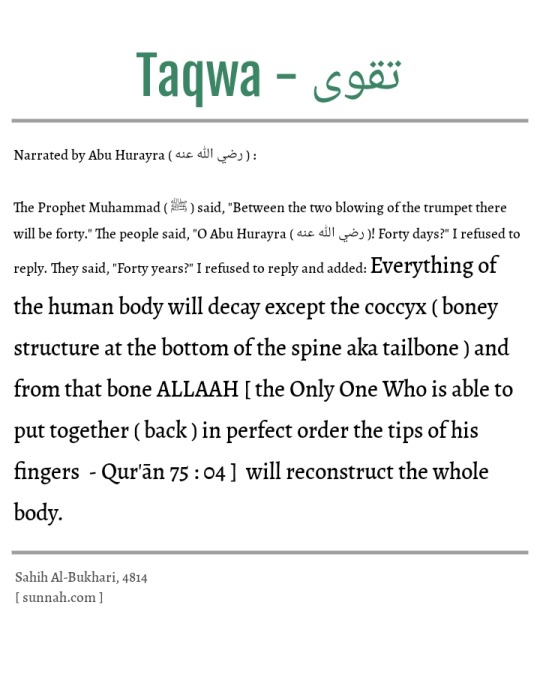
#islamic posts#islamic knowledge#islamicreminders#islamicquotes#salaf#salafimanhaj#salaf us salihin#sayingsofthesalaf#companionsofprophet#sahabas#dhikr#muslim#repentance#taqwa#tawheed#tawakkul#welcome to islam#revertmuslims#ahlussunahwaljamaah#alfirqatunnajiah#islamic books#islamic jurisprudence#islamic video#Qur'an#sunnah#aqeedah#hadiths#reminderbenefitsthebelievers#saved sect
5 notes
·
View notes
Text

#islamic posts#islamic knowledge#islamicreminders#islamicquotes#salaf#salafimanhaj#salaf us salihin#sayings of the salaf#dhikr#muslim#repentance#taqwa#tawheed#tawakkul#welcome to islam#revertmuslims#ahlussunahwaljamaah#alfirqatunnajiah#Islamic jurisprudence#islamic video#islamic books#Qur'an#sunnah#aqeedah#hadiths#reminderbenefitsthebelievers#islamic queries
4 notes
·
View notes
Text
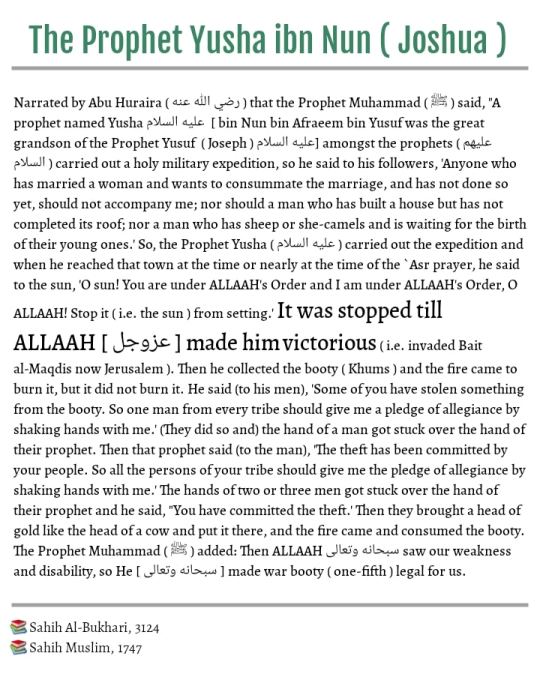
The ONLY Human for whom the Sun was stopped and a Prophet ( عليه السلام ) who was very close to Prophet Mūsa ( Moses ) عليه السلام
#islamic posts#islamic knowledge#islamicreminders#islamicquotes#salaf#salafimanhaj#salaf us salihin#sayingsofthesalaf#companionsoftheprophet#sahabas#dhikr#muslim#repentance#taqwa#tawheed#tawakkul#welcome to islam#revertmuslims#ahlussunahwaljamaah#alfirqatunnajiah#islamic videos#islamic jurisprudence#islamic books#Qur'an#sunnah#aqeedah#hadiths#reminderbenefitsthebelievers
2 notes
·
View notes
Text


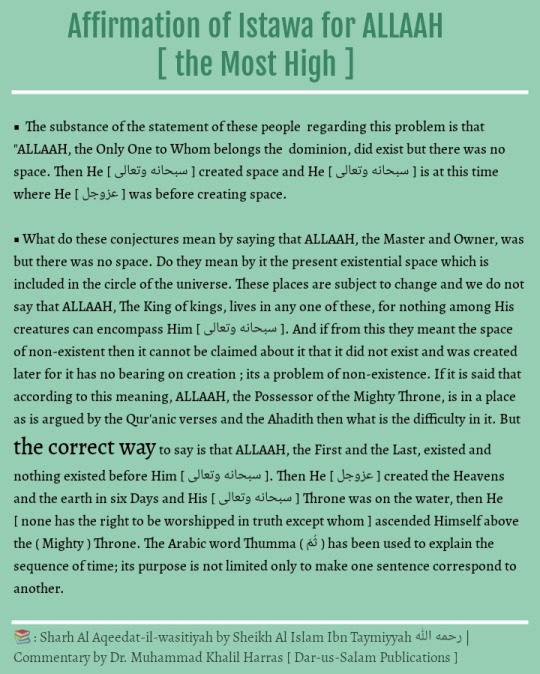
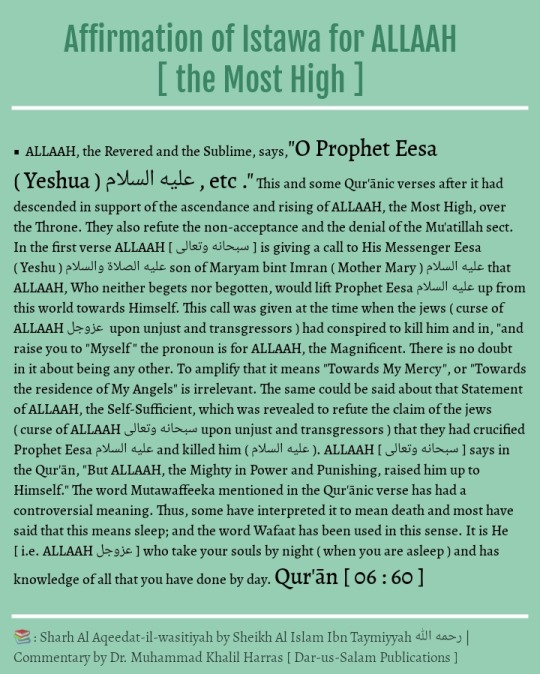

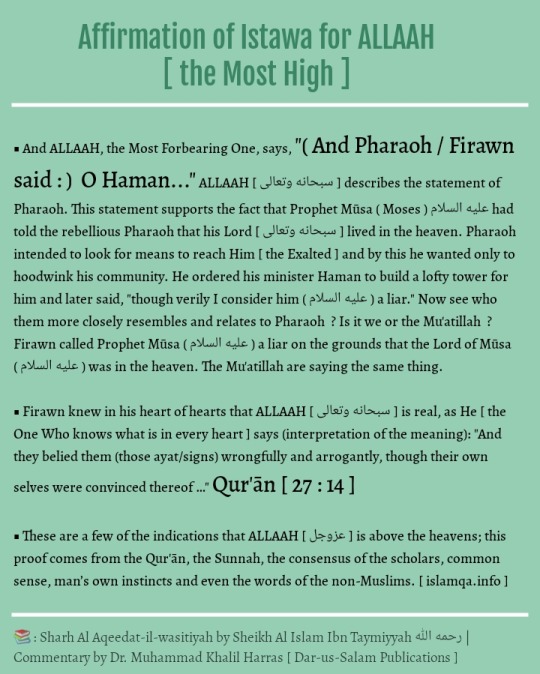

Aqeedah series, part XXV [ B ]
Where is ALLAAH, the Throne-bearer ?
#islamic posts#islamic knowledge#islamicreminders#islamicquotes#salaf#salafimanhaj#salaf us salihin#sayingsofthesalaf#companionsoftheprophet#sahabas#dhikr#muslim#repentance#taqwa#tawheed#tawakkul#welcome to islam#revertmuslims#ahlussunahwaljamaah#alfirqatunnajiah#islamic jurisprudence#islamic books#islamic videos#Qur'an#sunnah#aqeedah#hadiths#reminderbenefitsthebelievers
2 notes
·
View notes
Text

🇵🇸🤲 Pray for the Ummah
#salaf#salafimanhaj#salaf us salihin#sayingsofthesalaf#companionsoftheprophet#sahabas#dhikr#muslim#repentance#taqwa#tawheed#tawakkul#welcome to islam#revertmuslims#ahlussunahwaljamaah#alfirqatunnajiah#islamic books#Qur'an#sunnah#aqeedah#reminderbenefitsthebelievers#Afghanistan#Kashmir#Uyghurs#China#ethiopian genocide#Rohingya#Yemen#Sudan#Congo
4 notes
·
View notes